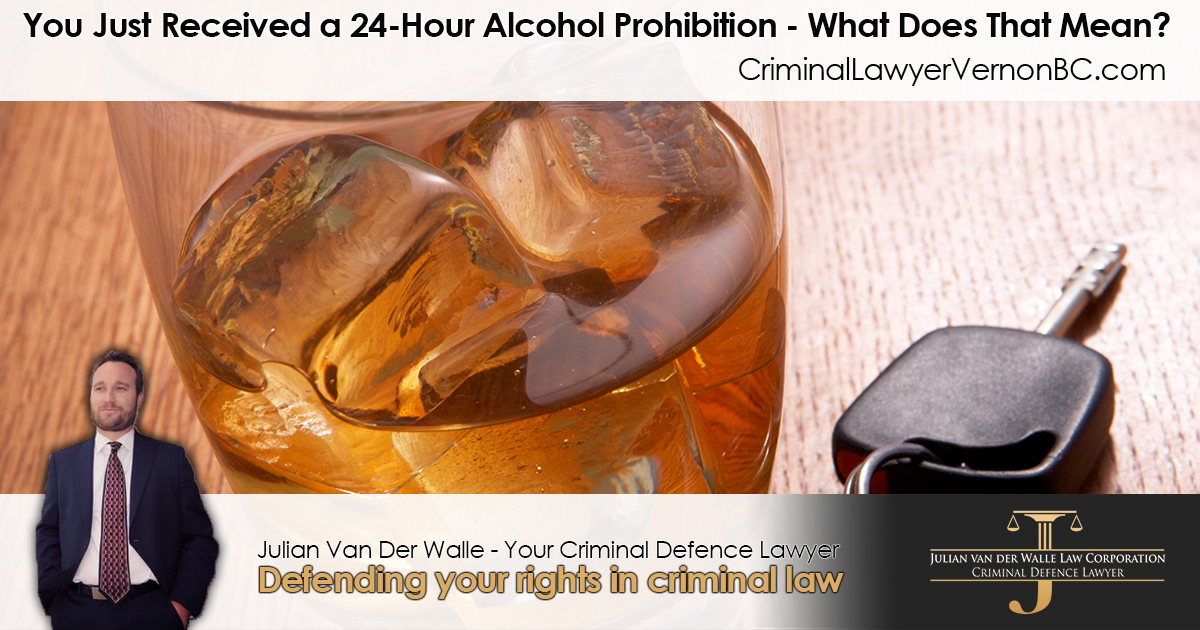You Just Received a 24-Hour Alcohol Prohibition – What Does That Mean?

Driving a motor vehicle under the influence of ether alcohol or narcotics is a very serious issue both from a legal standpoint and from a safety perspective. Intoxicated motorists create genuine road risks to both themselves and other drivers. The real public safety concerns accompanying drunk driving incidents have understandably resulted in a strong public policy response that may affect you.
If you are caught driving under the influence, one of the most common punishments is a 24-hour driving prohibition. Under Section 215 of the Motor Vehicle Act, a law enforcement officer can issue a 24-hour driving prohibition for driving either while adversely affected by alcohol or drugs. The 24-hour driving prohibition is exactly what it sounds like: violators must forfeit their right to drive a motor vehicle for the next 24 hours. That said, a 24-hour prohibition carries other consequences, such as appearing on your driving record that are also important considerations.
The Procedure for Receiving a 24-Hour Alcohol Prohibition
A 24-hour prohibition itself is not a complicated issue to understand, but it can be frustrating to understand the procedure behind the grant of the prohibition. First, when peace officers begin to investigate impaired driving cases, they must have reasonable and probable grounds to believe that alcohol or drugs were involved. A peace officer cannot simply pull anyone off the streets and test for alcohol and drugs. Without that reasonable suspicion, the prohibition can be thrown out on appeal. Even if the peace officer later conducts either a breathalyzer or drug test, that later-provided evidence cannot be used to sustain the initial charge.
The Effect of a 24-Hour Driving Prohibition
As discussed in the introduction, a 24-hour driving prohibition is just that: a prohibition on driving a motor vehicle for the next 24-hours. However, this prohibition can have very serious consequences regardless of how short of a prohibition period it actually is. For some, the prohibition is merely an inconvenience. For others, however, the prohibition means a lot more. Many occupations require regular travel or long commute times. A 24-hour driving prohibition can thus result in the violator having to skip work or lose certain opportunities because he or she was unable to drive at that time. Long haul truckers often require a clean driving record to maintain employment.
Another major consequence of the 24-hour driving prohibition is that it is recorded on your driving record. Having to explain that you are currently on a driving prohibitions may deny you particular career opportunities. Normally, one or two 24-hour driving prohibitions does not create a serious long-term problem. But, for those who have a tendency to drink in excess regularly, multiple 24-hour driving prohibitions could result in additional prohibitions from the Superintendent of Motor Vehicles.
These reasons, and others, are why 24-hour driving prohibitions are so bemoaned by ordinary people. The driving prohibition is not only inconvenient, but it can have real consequences. As a result, appeals of 24-hour prohibitions are not uncommon, and sometimes the prohibitions are overturned.
How Can I Challenge My Prohibition?
If you believe that the prohibition was wrongfully given, you do have rights of appeal. First, you can appeal your 24-hour alcohol prohibition to an adjudicator working for RoadSafetyBC. This type of appeal is not a formal court appeal, but is rather an administrative appeal. If the adjudicator does not agree with your version of events, you can appeal further to a justice of the BC Supreme Court. If your prohibition was given for drug influence, however, your only right of appeal is directly to the BC Supreme Court – there is no intermediate appeal to an adjudicator for drug-related prohibitions.
If you have received a 24-hour driving prohibition, you should contact an experienced criminal lawyer as soon as possible if you want to appeal the prohibition.
Related Stories
Does drug addiction cause more crime?
Many in Canada often associate drugs with crime, and in many cases, the possession or use of drugs is itself a crime. More recently, a spotlight has been placed on drug-related incidents due to the opioid crisis afflicting the nation. Sociologists have spent...
Why You Should Hire a Vernon Criminal Defense Attorney
As a whole, the Canadian justice system is very fair. The accused enjoy the right to be present and be heard in court, the right to remain silent, and the right to representation by legal counsel. That last right is one of the most important rights of all. This...
Bad IRP Decision? What Can You Do About It?
Bad IRP Decision? What Can You Do About It? Drivers who are caught driving under the influence by the police may receive an Immediate Roadside Prohibition (IRP) on driving. An IRP is a temporary driving suspension that prevents the recipient from driving for a...
REQUEST A FREE CONSULTATION
Call 1.877.212.9645
Or fill out the form below to receive a free and confidential initial consultation.
